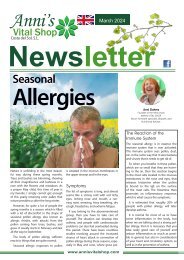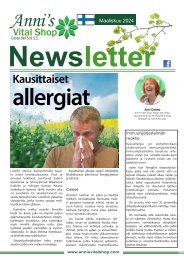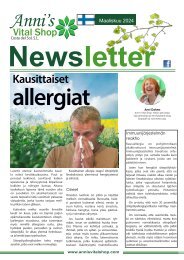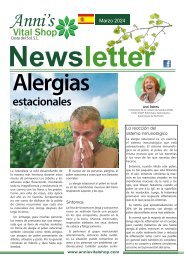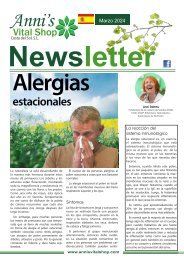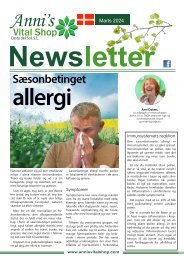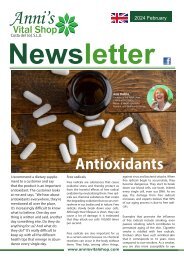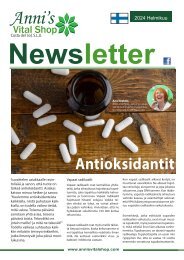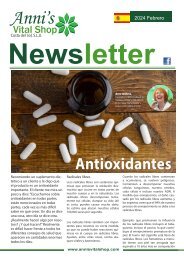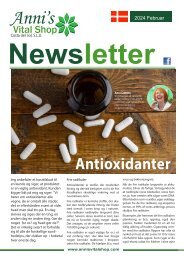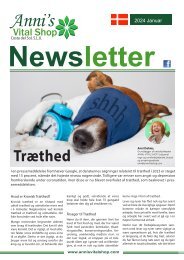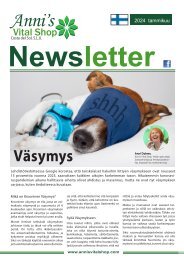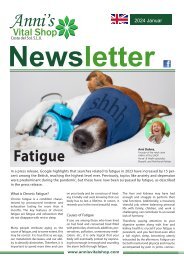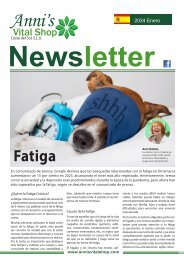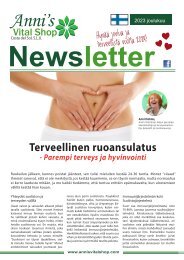Muscles
One of my friends recently gave me a large and heavy anatomy atlas. She was moving, and the book was too heavy to take with her.
One of my friends recently gave me a large and heavy anatomy atlas. She was moving, and the book was too heavy to take with her.
You also want an ePaper? Increase the reach of your titles
YUMPU automatically turns print PDFs into web optimized ePapers that Google loves.
2017 February<br />
Costa del Sol, S.L.<br />
Newsletter<br />
<strong>Muscles</strong><br />
By Anni Dahms<br />
Owner of the retail chain<br />
ANNI’s VITAL SHOP.<br />
Nurse- & Health<br />
specialist, Biopath and<br />
Nutritional Adviser.<br />
One of my friends recently gave me a large and heavy anatomy atlas. She was moving, and the book was<br />
too heavy to take with her.<br />
The book is German and very beautifully illustrated. I thank her many times for it and randomly open the book, ending at the<br />
section on muscles. This causes me to reminisce back to my nursing exam, many years ago. Many excruciating hours were spent<br />
memorising the names and functions of a load of muscles.<br />
The hours studying the many and difficult names of our muscles were to be multiplied many times over, as I later become the<br />
teacher at nursing schools and other educational institutes.<br />
The muscle types can be roughly shared<br />
into 3 groups.<br />
1. Smooth muscle<br />
This smooth musculature works subconsciously, and is found<br />
in the inner organs and walls go the blood vessels.<br />
It is controlled by the autonomous nervous system.<br />
2. Cardiac muscles<br />
The cardiac muscles work quickly, durably and has its own<br />
rhythm, which is adjusted up and down with help of the<br />
autonomous nervous system.<br />
3. Striated skeletal muscle<br />
The striated skeletal muscle has an impact on how our entire<br />
musculoskeletal system works.<br />
www.annivitalshop.com<br />
1
It is of importance to all movements of<br />
the body and extremities.<br />
It protects our inner organs.<br />
It takes part in heat regulation.<br />
It contributes to the circulation of blood.<br />
Use muscles or lose them<br />
If you don’t use your muscles, they gradually<br />
become smaller and smaller and<br />
can’t hold together on the joints.<br />
We have more than 100 different muscles<br />
that strengthen movements and<br />
keep up upright. Not using your muscles<br />
will result in them shrinking and becoming<br />
weak. Anyone who has broken a<br />
bone and needed to wear a plastic cast<br />
will have experienced this.<br />
Exercise is important. It increases muscle<br />
mass, strength and bone density.<br />
<strong>Muscles</strong> like to be used. If you wish to<br />
strengthen a group of muscles then they<br />
must be activated regularly. It’s a good<br />
idea to train the large muscle groups in<br />
the body, the legs and the arms..<br />
Muscle pain<br />
There can be many reasons for muscle<br />
pain. Muscle pain often occurs if the<br />
muscles have been overburdened e.g.<br />
from over-exercising. The pain disappears<br />
quickly after a couple of days.<br />
Other reasons for muscle pain can be<br />
arthritis, or crookedness of the spine that<br />
results in you over-burdening certain<br />
muscle groups.<br />
Muscle pain can also appear due to a<br />
herniated disc, where there is pressure<br />
on the nerves and to the muscles.<br />
If you have done a lot of sport and have<br />
numerous pulled muscles, this can result<br />
in scar tissue in the muscles which gives<br />
muscle pain.<br />
A very common muscle disease, which<br />
we Danes call “window-shopper syndrome”<br />
or claudication, is caused by<br />
atherosclerosis, bad blood circulation.<br />
Often, it is people suffering from diabetes<br />
that have the illness. When walking,<br />
pain suddenly appears in your legs making<br />
it difficult to walk. The pain in your<br />
legs disappears when you sit.<br />
Furthermore, many of us suffer from<br />
muscle pain without quite knowing<br />
why. In my experience, certain kinds of<br />
muscle pain with swelling and stiffness<br />
in the joints can be caused by allergy or<br />
intolerance. Allergy or intolerance to certain<br />
foods, most often wheat and dairy<br />
products. It could also be preservatives,<br />
flavour enhancers, pesticides and other<br />
chemicals.<br />
Also, muscle and joint pain can be a<br />
symptom of vitamin and mineral deficiency.<br />
E.g. Vitamin B6, magnesium, folic<br />
acid and vitamin C.<br />
Food you should stay<br />
away from<br />
Many are nutritionally malnourished,<br />
because of the food in our every day<br />
diet. It consists of way too much bread,<br />
pasta, fast food burgers, pizzas as well as<br />
cakes and other sugary foods.<br />
Combine this with unhealthy drinks and<br />
you are inviting muscle problems into<br />
your life.<br />
Be careful what you drink. Stay far away<br />
from cola and other soda pops, and acidic<br />
drinks. Don’t drink too much coffee.<br />
Be aware that coffee is addictive. You<br />
should know, that more than 4 cups a<br />
day can give problems with muscle pain.<br />
Drink plenty of clean water then you can<br />
better tolerate your coffee.<br />
Food that strengthens<br />
Our whole body, the muscles included,<br />
need good complete protein substances.<br />
Therefore, it is important for your<br />
muscles that you get enough healthy<br />
protein.<br />
If you eat dairy products, then milk,<br />
cheese and yoghurt are good sources<br />
of protein. Egg is also a good source of<br />
protein. Beef, calf, pig, sheep, lamb, goat,<br />
fish and shellfish all contain protein.<br />
Should you prefer to obtain your protein<br />
from vegetable products, or as a supplement,<br />
then lentils, beans in the form<br />
of soya beans and legumes are good.<br />
Seeds, e.g. sesame seeds, nuts, almonds.<br />
Whole grain products, e.e. brown rice,<br />
soya beans and quinoa. Much of the<br />
newer superfoods also contain protein.<br />
For example, wheatgrass, which is alkaline<br />
and contains many micro nutrients<br />
and also strengthens the adrenal glands.<br />
It is rich in amino acids and contains<br />
about 27% protein.<br />
Protein – how much do<br />
we need?<br />
It is a discussion among many circles<br />
to how much protein we need. You<br />
need for protein definitely depends on<br />
where you daily level of energy lies. Do<br />
you do a lot of sport? Or do you have a<br />
normal energy level? The World Health<br />
Organisation recommends that you have<br />
0,75 g protein per kilo bodyweight daily.<br />
That would mean that a person of about<br />
75 kg needs about 55 g. of good protein<br />
daily. Usually, it’s elderly people who<br />
have a protein deficiency in their daily<br />
lives. this is often due to them eating<br />
very lightly and unilaterally. Make sure<br />
to eat a versatile mix of organic foods,<br />
that contain good carbohydrates, polyunsaturated<br />
fats and proteins. This will<br />
ensure that you get a good foundation<br />
for your muscles.<br />
Corn of all sorts contain protein. Protein<br />
is broken down into amino acids in<br />
order to be absorbed in the body.<br />
Unfortunately, corn products lack the<br />
amino acid lysine. The low content of<br />
lysine influences how well the other<br />
2 www.annisvitalshop.com
amino acids are used. Hence it is good to<br />
supplement corn products with lysine-rich<br />
food, e.g. vegetables and legumes, sesame,<br />
buckwheat, millet or dairy products.<br />
If you are hungry before bedtime, then<br />
take a bit of fruit, a small bun with honey<br />
or with cottage cheese before going to<br />
bed. This will provide your muscles with<br />
something to work with throughout the<br />
night.<br />
Supplements<br />
• Make sure your diet is being supplemented<br />
with a broad spectrum vitamin/<br />
mineral supplement.<br />
• There are many liquid forms of vitamins,<br />
minerals and amino acids available.<br />
• A variant of the product above is also<br />
available especially for people who do a<br />
lot of sport. It also contains a lot of other<br />
nutrients.<br />
• You can prevent many muscle problems,<br />
by consuming a vitamin supplement<br />
that contains all the vitamins, with quite<br />
high doses of the B vitamins as well as<br />
vitamin A, D and E. The minerals you<br />
should pay special attention to are calcium<br />
and magnesium, along with selenium,<br />
potassium and manganese.<br />
• Selenium deficiency can lead to muscle<br />
weakness.<br />
• Sore muscles can be eased by eating<br />
rose hip. It’s available as capsules and in<br />
powder form.<br />
• An extra supplement of magnesium<br />
can be a good idea, as it helps the functioning<br />
of your muscles.<br />
• Spirulina is an algae. About 60% of the<br />
dried substance consists of proteins and<br />
thereby supplies the muscle with essential<br />
amino acids.<br />
• Ginger can be a great help if your<br />
muscles are stiff or sore. Available both as<br />
powder and capsules. Ginger is found in<br />
various mixes, e.g. with turmeric.<br />
Add ginger to your smoothies.<br />
• Carnosine consists of two amino<br />
acids. It is produced in the body and concentrates<br />
in the muscles when they are<br />
working. It is also found in the heart, the<br />
brain and many other parts of the body.<br />
The content of Carnosine in the muscles<br />
and heart decrees with age, leaving you<br />
tired more easily. Here, a supplement of<br />
Carnosine would do wonders.<br />
• Q10 is a co-enzyme that works in our<br />
mitochondria, which is the cells energy<br />
plant. We produce it ourselves, and is also<br />
supplied from a large part of our diet.<br />
However, the bodies deposit of Q10 is<br />
reduced with age and in crisis situations.<br />
Studies have been made showing how<br />
Q10 can protect against muscle damage,<br />
for people participating in hard sports.<br />
The result was published in the magazine,<br />
“European journal of nutrition”.<br />
• Omega-3 oil helps flexibility in the<br />
muscles and reduces muscle soreness<br />
and possible inflammation. Omega-3 is<br />
available as fish oil and in various forms<br />
of algae. The latter has gained immense<br />
popularity in recent years, and can also be<br />
used by vegans.<br />
• The amino acid L-Carnitine is produced<br />
in the body. It is taken as a supplement,<br />
should you wish for more energy<br />
in the muscles, especially in the muscle<br />
of the heart. It can contribute to the<br />
improvement of an irregular heartbeat.<br />
L-Carnitine is also known to reduce cholesterol,<br />
and also for reducing triglycerides.<br />
Works best with Vitamin C.<br />
Tips<br />
• There are plenty of soothing balms,<br />
liniments and ointments to apply to sore<br />
muscles. Find out for yourself or visit your<br />
health shop to find out which is best suited<br />
for your needs.<br />
• Exercise is good. If you are unused to<br />
www.annisvitalshop.com<br />
exercising, then start up slowly and find a<br />
level in which you feel comfortable with.<br />
Only you can feel, where you stand and<br />
how much you can manage. You must<br />
find a form of exercise that you will stick<br />
with. If you do too much hard exercise, it<br />
can contribute to inflammation.<br />
• In 1859 Søren Kierkegaard wrote in<br />
a letter, “whatever you do, do not lose<br />
the lust to walk”. It is a sentence which I<br />
have personally taken to heart. I go on<br />
long walks daily, and can really feel how it<br />
strengthens me both physically and mentally.<br />
I have walked away many a worry<br />
and turned heavy thoughts to happy<br />
thoughts.<br />
• Louise Hay writes about likely problems<br />
with muscles: “Resistance to new<br />
experiences. The muscles represent our<br />
ability to move in this life”. As a new<br />
thought pattern she suggests:<br />
”I experience life as a<br />
happy dance”<br />
3
NEW!<br />
VegOmega-3®<br />
An ideal vegetarian alternative to<br />
fish oil.<br />
One capsule contains 250 mg DHA<br />
and 125 mg EPA. In combination with<br />
the other Omega-3 fatty acids in the<br />
product, give a collected total intake<br />
of 426 mg daily.<br />
Buy VegOmega-3 - now on<br />
offer in Anni’s Vital Shop!<br />
SAVE 2.94€<br />
26.50€<br />
60 capsules<br />
QUALITY WITHOUT COMPROMISE<br />
The offer is valid from 01.02 - 28.02.2017 while stocks last!<br />
Fuengirola<br />
NEW ADDRESS!<br />
Avda. Los Boliches Bajo,<br />
Edif. Don Luis 2 B<br />
E-29640 Fuengirola<br />
Tel: +34 952 667 087<br />
lb@annivitalshop.com<br />
skype: avslosbol<br />
Open daily 10am-8pm<br />
Saturday 10am-2pm<br />
Marbella - Elviria<br />
Centro Comercial Pino Golf,<br />
Ctra. de Cadiz Km192, Local<br />
16<br />
E-29604 Marbella (Elviria)<br />
Tel: +34 952 850 094<br />
el@annivitalshop.com<br />
skype:avselviria<br />
Open daily 10am-6pm<br />
Saturday10am-2pm<br />
Mijas Costa<br />
Carrefour, Local 10,<br />
E- 29649 Mijas Costa<br />
Tel: +34 952 198 231<br />
mijascosta@annivitalshop.com<br />
skype: avs.euromarket<br />
Monday–Saturday<br />
10am-10pm<br />
4 www.annisvitalshop.com




